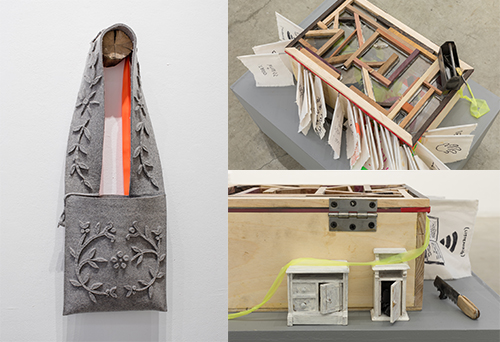
Wednesday, January 10, 12–2pm
Blackwood Gallery
FREE and OPEN TO THE PUBLIC
This Feminist Lunchtime Talk is presented in partnership with Women and Gender Studies (UTM), in conjunction with the exhibition #callresponse on view at the Blackwood Gallery from January 8–27, 2018, and as part of Take Care, Circuit 4: Stewardship.

Indigenizing Institutions
Wednesday, January 10, 12–2pm
Blackwood Gallery
Following the publication of Canada’s 2015 Truth and Reconciliation Commission report and resistance to celebrations of Canada’s 150th anniversary in 2017, many Indigenous groups and allies have called for greater attention to the legacies of discrimination and oppression that have shaped the development of the nation. This panel responds to these calls by asking what it means to effectively Indigenize an institution, in a society deeply shaped by settler colonialism. Our esteemed panel of discussants will share their experiences of Indigenizing institutions in the GTA and across Canada, including the problems, paradoxes, and possibilities of these efforts.
Participants:
Jill Carter, Assistant Professor, Centre for Drama, Theatre and Performance and Centre for Indigenous Studies, University of Toronto
Tarah Hogue, Senior Curatorial Fellow, Indigenous Art, Vancouver Art Gallery
Denise Booth McLeod, Indigenous and Community Engagement Coordinator, Toronto Birth Centre
Kris Noakes, President, Peel Aboriginal Network
Moderator: Nicole Laliberte, Assistant Professor, Geography, University of Toronto Mississauga
This event is the third in a series of Feminist Lunchtime Talks featuring artists, writers, activists, and academics working across issues of labour, gender, race, and identity in the context of the crisis of care. The talks put artists participating in Take Care and other guest speakers into conversation with UTM faculty respondents.
The Feminist Lunchtime Talks are presented in partnership with Women and Gender Studies (UTM).
Jill Carter (Anishinaabe/Ashkenazi) is a Toronto-based theatre practitioner and Assistant Professor with the Centre for Drama, Theatre and Performance Studies; the Aboriginal Studies Program; and the Transitional Year Programme at the University of Toronto. Her research and praxis base themselves in the mechanics of story creation (devising and dramaturgy), the processes of delivery (performance on the stage and on the page), and the mechanics of affect.
Tarah Hogue is a curator and writer of Métis and Dutch Canadian ancestry. She is the inaugural Senior Curatorial Fellow, Indigenous Art at the Vancouver Art Gallery and was the 2016 Audain Aboriginal Curatorial Fellow at the Art Gallery of Greater Victoria. Hogue was curator in residence with grunt gallery between 2014–2017, and has curated exhibitions at the Morris and Helen Belkin Art Gallery, Or Gallery, and SFU Gallery.
Nicole Laliberte is Assistant Professor, Teaching Stream in the Department of Geography at the University of Toronto Mississauga (UTM). Her research is located at the intersection of geography, feminist theory, and critical development studies. She studies systems of violence, including settler colonialism, as well as feminist and anti-oppression pedagogies in the undergraduate classroom. Professor Laliberte serves on the Board of Director’s of UTM’s Women and Gender Studies Program, and on UTM’s Indigenous Initiative Task Force.
Denise Booth McLeod is Anishnaabe (Ojibway) and her ancestral lands are Sagamok Anishnawbek First Nation on the North Shore of Lake Huron. She has worked closely with urban Indigenous community in Toronto as the Cultural Coordinator at the Native Canadian Cultural Centre, Urban Indigenous Family Violence Prevention, and Culture Coordinator at the Native Women’s Resource Centre. She is currently the Indigenous and Community Engagement Coordinator at Toronto Birth Centre.
Kris Noakes is an Anishinaabe citizen of Nipissing First Nation and the President of Peel Aboriginal Network. She is active in the community and serves in many advisory roles including in a First Nations advisory role on the City of Mississauga’s Diversity and Inclusion Advisory Committee and as a part of the Toronto Area First Nation, Métis, and Inuit Educational Leads for the Indigenous Education Office of the Ministry of Education.
#callresponse is co-organized by Tarah Hogue, Maria Hupfield and Tania Willard. We acknowledge the politics of violence in North America as it relates to Indigenous lands and bodies including on the many Indigenous territories where the projects take place, whether they are ancestral, traditional, unceded, unsurrendered, urban, rural and/or reserve.
#callresponse, Blackwood Gallery, and Letters & Handshakes extend deepest thanks to all the participating artists, respondents, and the networks that support the important work they undertake at all levels. Thank you also to those who have led and participated in the programming around the exhibition.
The Blackwood Gallery gratefully acknowledges the operating support of the Canada Council for the Arts, the Ontario Arts Council, and the University of Toronto Mississauga.

The Blackwood Gallery is grateful for the generous support of #callresponse from the Jackman Humanities Institute Artist-in-Residence Program, the BC Arts Council, and grunt gallery, with additional support from the Department of Visual Studies and Women and Gender Studies (UTM).
Funding for staff support was made possible through the Young Canada Works in Heritage Organizations Graduate Internship program, Department of Canadian Heritage. The Canadian Museums Association administers the program on behalf of the Department of Canadian Heritage.
